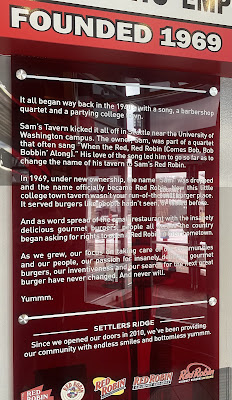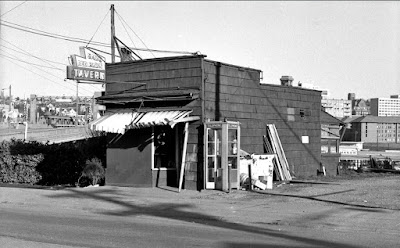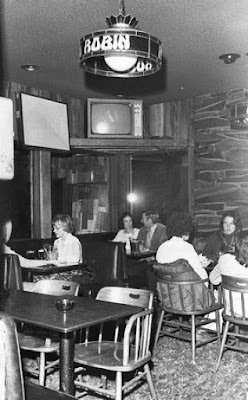 |
| Red Robin origin story as posted in Robinson, PA |
Parts of this story (eliding the pot smoking) were enthusiastically adopted by the current Red Robin corporation, and indeed, a version of the story greeted me on the wall of our restaurant in Pittsburgh -- and, one presumes, across the country. Part of the origin story on the company web site, repeated in Wikipedia, and now in plexiglass within the restaurants themselves reads:
Red Robin mascot c. 1960s-1970s
"This building dated from 1940 and was first called Sam's Tavern. The owner, Sam, sang in a barbershop quartet and could frequently be heard singing the song "When the Red, Red Robin (Comes Bob, Bob, Bobbin' Along)." He liked the song so much that he eventually changed the name to Sam's Red Robin." -- wikipedia
I really appreciate it when bars include documentation on their origins, and this is a nice story. However, when one reviews primary sources it does not appear to be true. For starters, the place appears to have been constructed in 1916 rather than 1940, and to have been named "Red Robin" for several years and multiple owners before Sam [Caston]. Polk directories begin listing Red Robin at the address in 1942 under owner H.M. McDonald and later J.R. Raymond. Even earlier it is listed under bars from 1940 to 1942 with just the name of owner Glenn McCall. Sam Caston appears to have taken ownership sometime between 1951 and 1953 (inclusive), and one guesses that he simply changed Red Robin to "Sam's Red Robin."
 |
| Original Red Robin location c.1969 Paul Gillingham photo |
When it comes to the hippy/biker/student era a few decades later, we have the benefit of having many old patrons still around, including local historians Paul Dorpat and Roger Wheeling. I'm taking the liberty of adding a few comments from locals about those times, taken from a Facebook conversation and a great Clay Eals article, to help capture the flavor:
 |
| 1937 view of building that would become Red Robin (Building constructed in 1916) |
- "I had friends down the street. We went there often. I remember peanut shells all over the floor. '69 '70 maybe '71." Gary H.
- "Friday was $.10 beer night, with $1.25 burger baskets. Usually got there early and bought $2.00 worth of beer, filling the table. By 9pm, we were relieving ourselves off the back deck. Great times. That's the Red Robin I know." David M.
- "During the ‘60’s I lived a little south of the Red Robin. When me and my young buddies walked by we made sure to walk on the sidewalk across the street out of fear of the bikers out front. We had heard stories." Kim S.
- "In the old Robin, if they’d passed a pool cue around, someone would have smoked it." Seattle Times restaurant columnist John Hinterberger
- "Had my first legal beer there in 1957. Was there quite a bit. My favorite Tavern and in those days a hangout for the poets and artist colony in the houseboats below. Sam, the then owner was encyclopedic in his knowledge of Pacific Coast League baseball and the Seattle Rainiers. Seattle lost a great institution when Sam sold it." Stan W.
- 'The original was the best. I had short hair because I was in the service. 1967. So I would hear , “narc. Narc”. When I’d go in. Until the regulars go to know me.' Don M.
- "I am a vendor for Red Robin and supply all 535 stores. last time I was at corporate (in Denver Colorado now) they said they just couldn’t keep the property because it was literally falling apart and slipping down the hill. I don’t think they really had a choice whether to keep it or dump it from their portfolio." Carol D.
- "Did a lot of etched glass work for RR, and other Kingen establishments when working for Trade*Marx Sign Co early '80s." Ryan C.
 |
| Interior view of Red Robin c.1973 Photo via Chuck Gould |
Over the next few years Kingen would expand and remodel the Robin location and revamp the menu. He added a strip steak based on the one served in the train cars of "Andy's Diner," and 28 different kinds of burgers, creating what he would describe as a "burgers and booze" model, and "a McDonalds for adults." (Seattle Times) The concept worked, and he would soon open a second location in Northgate Mall. Although Kingen says he considered franchising at the time, that phase was actually kicked off in 1979 when Mike and Steve Snyder convinced him to allow them to become a franchisee of the concept. Mike Snyder's restaurants were a success, and he quickly expanded to 14 locations. (Yakima Herald) The expansion into a nationwide chain of hundreds would come after the franchise was purchased by Japanese corporation Skylark.
 |
| Large deck and parking lot expansion Original Red Robin, c.1970 Photo via Taylor Ward |
Kingen sold a 30% share to Skylark in 1985, and a total of 90% by 1987. Expansion continued but by 1995 sales were slumping in the corporate owned restaurants. Skylark turned to Mike Snyder, whose 14 franchises were thriving by comparison, as well as asking Kingen to return. Snyder would be named President and CEO in 1996. Under Snyder's leadership, the fortunes of the chain would turn around. and merge with Snyder's franchise units in 2000. Later, with approximately 200 restaurants in place, the company would go public in July 2002. (referenceforbusiness)
Originally planning to expand to 850 restaurants, reaching at least as high as 572 in 2019, and with the stock peaking in 2015, the brand has struggled a bit, decided in 2018 to halt expansion (nrn), and settled back down to around 500 locations at this writing. In the meantime, the original location above Portage Bay closed its doors in March 2010, citing high maintenance costs. Although there followed rumors of a new restaurant in the old building, it remained empty until it was razed in 2014. A new 3-story mixed use building took its place, with the bottom floor hosting Johnny Mo's Pizzeria, a joint effort of buddies Johnny from New York and Mo from Chicago.
Re. the two great characters behind the modern franchise, Gerry Kingen carries on, currently working on expanding Seattle's Pecos Pit BBQ (local sports fans recognize its first location south of the baseball stadium). (pecospit) Mike Snyder, whose son Graham started two restaurants of his own in Yakima -- Cowiche Canyon Kitchen & Icehouse and the E.Z. Tiger -- tragically died of a self-inflicted gun wound in Dec 2018. (yakimaherald)
3272 Fuhrman Ave. E., Seattle WA
Est. 1940? - Closed March 21, 2020 - Building constructed: 1916
Web site: redrobin.com - facebook
Articles: pauldorpat - seattletimes - mashed - referenceforbusiness - yakimaherald - wikipedia -


No comments:
Post a Comment